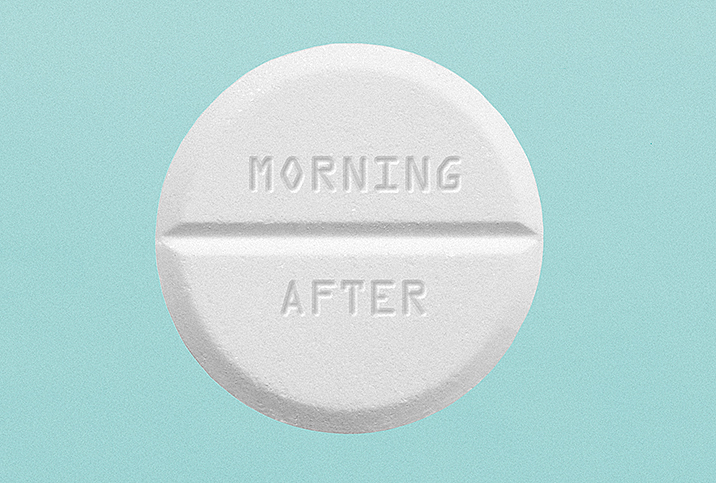Dispelling Misinformation About the Morning-After Pill

There are few drugs as misunderstood as the morning-after pill, commonly known as Plan B. Most people know it's a form of contraception, but some falsely believe it's an abortifacient (a drug causing abortion).
The reality is, this pill can prevent abortions, not cause them. In a 2012 joint statement from the International Federation of Gynecology and Obstetrics and the International Consortium for Emergency Contraception, the organizations cited several studies that indicate Plan B "cannot interrupt an established pregnancy or harm a developing embryo." Instead, it prevents ovulation and, therefore, fertilization. Which means, less unwanted pregnancies and therefore fewer abortions.
Despite this evidence, misinformation about the morning-after pill is still rampant. One issue may be that some people confuse Plan B with the abortion pill. However, they don't work the same way.
"The morning-after pill, also known as emergency contraception, helps prevent pregnancy; the abortion pill, also known as medication abortion, ends pregnancy," states the Planned Parenthood website.
Furthermore, if a woman is already pregnant, the morning-after pill will not cause her to have an abortion. "It does not function in that manner, it does not work if a woman is already pregnant," said Kecia Gaither, M.D., who is double board-certified in OB-GYN and Maternal-Fetal Medicine and director of Perinatal Services at NYC Health and Hospitals/Lincoln.
So, how does the morning-after pill work?
As stated above, the morning-after pill prevents ovulation, so there is no egg for the sperm to fertilize.
"In order to become pregnant, a sperm must fertilize an egg," said Kelly Culwell, M.D., a board-certified OB-GYN and nationally renowned women's health expert. "Sperm have life spans of up to five days inside the female reproductive tract, so delaying ovulation can prevent the viable sperm from being able to reach an egg."
Even though it's called "the morning-after pill," you don't have to wait until the morning to take the pill. It should, however, be taken within 120 hours (five days) of unprotected sex or a failed birth control method to be effective. If you take the pill within 72 hours after you've had unprotected sex, it can reduce the risk of pregnancy by up to 87 percent, if taken as directed. When the pill is taken within 24 hours of unprotected sex, it can reduce the risk of pregnancy by 95 percent.
Some morning-after pills—including Plan B One-Step and Aftera—contain levonorgestrel. "This medication is a hormone, progestin, which functions to prevent ovulation, and subsequently prevents pregnancy," Gaither explained.
'Sperm have life spans of up to five days inside the female reproductive tract, so delaying ovulation can prevent the viable sperm from being able to reach an egg.'
You can find levonorgestrel over-the-counter at drugstores without an age restriction. Additionally, it may be covered by your health insurance, but if not, the most popular brand (Plan B One-Step) is about $50.
However, it's important to note that studies indicate levonorgestrel may not prevent pregnancy in women who weigh 165 pounds or more—and the pill is not effective at all for women who weigh more than 175 pounds.
Other morning-after pills—including the brand Ella—contain ulipristal acetate, a progesterone receptor modulator. This kind is only available with a prescription and is not recommended if you're already pregnant because the effects on a developing fetus are unknown.
How does the morning-after pill differ from an abortifacient?
"Emergency contraceptive pills, which include morning-after pills, do not impact an already established pregnancy—which is a pregnancy that has implanted in the uterus," said Culwell. "Medication abortion uses two different types of pills to stop the growth of an established pregnancy and then help the uterus expel the pregnancy like a miscarriage."
The abortion pill contains mifepristone, which induces abortion by blocking the hormones necessary for maintaining a pregnancy. The morning-after pill, on the other hand, contains medication (levonorgestrel or ulipristal acetate) that prevents a woman from ovulating. Both the morning-after pill and the abortion pill are highly effective at what they're intended to do, but what they do are two very different things.
Possible side effects of emergency contraception
The morning-after pill is a safe form of emergency contraception, but as with any medication, you may experience side effects, including:
- Nausea or vomiting
- Dizziness
- Fatigue
- Headache
- Breast tenderness
- Bleeding between periods or heavier menstrual bleeding
- Lower abdominal pain or cramps
- Delayed period by a week
If you're experiencing side effects that continue for more than a few days, speak to your doctor. Though rare, you may be experiencing an allergic reaction.
Additionally, if you are taking other medications, speak with your doctor before taking the morning-after pill. They can let you know if your current medications have any known interactions or affect the efficacy of levonorgestrel.


















